Last Updated on August 2, 2021
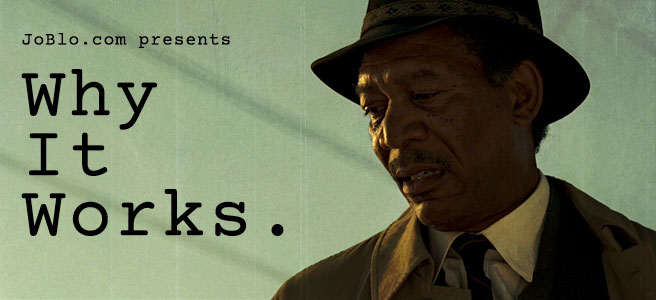 Why It Works is an ongoing column which breaks down some of the most acclaimed films in history and explores what makes them so iconic, groundbreaking, and memorable.
Why It Works is an ongoing column which breaks down some of the most acclaimed films in history and explores what makes them so iconic, groundbreaking, and memorable.
****SPOILERS AHEAD****
A young, white, wisecracking cop with a short temper. An older, sophisticated, black detective seven days from retirement. A diabolical killer on the loose. Anyway, enough about LETHAL WEAPON 3; this week, we're looking at David Fincher's psychological thriller SEVEN (or SE7EN, if you like). Set in a miserable unnamed city where it seems to rain all the time, following a series of grisly, disturbing murders, and featuring an ending as upsetting as it is fascinating, SEVEN is considered one of the darkest and grittiest studio films out there- and also one of the best. Here's why it works:
WHY WE LIKE THE CHARACTERS:
Perhaps one of the most interesting devices in storytelling is the inclusion of two diametrically opposed leads. We find ourselves identifying with one, the other, both, or neither depending on the scene. It also allows for some fascinating dialogue, in which the story's themes are discussed rather than preached. In David Mills, we have the sarcastic husband who keeps his ties pre-knotted partnered up with William Somerset, the erudite loner who lines his accessories on the dresser at night and carefully lays out his suit. While the characters come off as polar opposites at times, their shared goal to catch a killer overshadows much of the discord. Moreover, each character helps combat the bleak nature of the film in his own way. Somerset's refined, distinguished nature brings a level of class to the film (as does Morgan Freeman himself), while Brad Pitt's smart-assed, impatient Mills allows for moments of levity and immediacy and gives the average viewer a "regular guy" to latch onto. Similarly, in just a few scenes, Gwyneth Paltrow's Tracy shines a white light through the filth of the story, representing hope and purity in an otherwise depraved world.
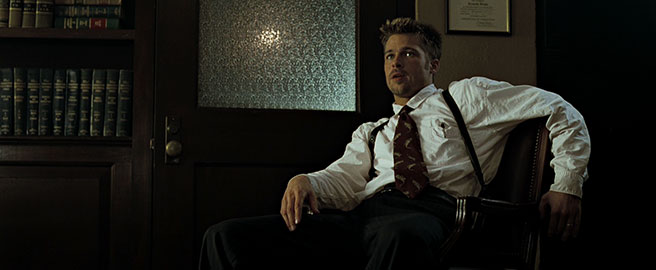 Costume design at work: Mills is always untucked, unironed, and slightly disheveled (while Somerset's three piece suits fit perfectly).
Costume design at work: Mills is always untucked, unironed, and slightly disheveled (while Somerset's three piece suits fit perfectly).
Finally, while he doesn't show up until the final thirty minutes of the film, John Doe is the axis around which SEVEN revolves. While he is certainly the villain and beyond redemption or sympathy by the time he makes his entrance, John's viewpoint makes a strange bit of sense in the world we're presented. While the detectives wait for fingerprint results, bribe the feds for library records, and analyze clues and classic literature- and still only catch their killer when he walks into their precinct with his hands in the air- John takes matters into his own hands, dealing out justice Old Testament style. While it's easy to say anyone can come up with his own ideas of right and wrong, John Doe specifically uses the idea of the seven deadly sins, whose origin has its roots in Biblical, Greco-Roman, and early Catholic teachings. Rather than inventing his own system, Doe is using a system of morality widely accepted throughout the Western world, begging the question of why his methods should be seen as wrong when the law ignores or allows sins every day. When we finally meet our criminal mastermind, he is brought to life by the incomparable Kevin Spacey, who plays John Doe as a thoughtful, witty, smug, and calculated man rather than a crazed maniac, thus bringing an unsettling amount of reason to a character we feel obligated to despise.
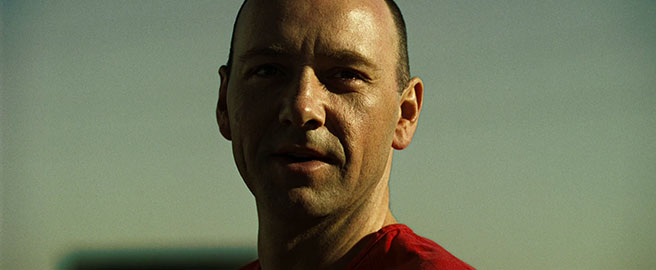 "Oh… he didn't know."
"Oh… he didn't know."
WHY WE CARE:
For two movies that couldn't be more different, it's appropriate that my last Why It Works was on SCOTT PILGRIM VS. THE WORLD. Just like SCOTT PILGRIM's seven evil exes, SEVEN gives us seven deadly sins, presenting us with a countdown to an inevitable finale. Once we realize the killer has a master plan, we can't help but want to follow along as the mysteries unfold; we only see the aftermath of the killings, after all, making us feel in a way like we ourselves are hunting him down. Along the way, we have our main characters' personal stories to keep us from feeling like we're just watching a grim procedural. Somerset wants to keep his distance from such a high profile case but can't help but get involved, Mills wants to prove his worth as the new guy on the force, eventually recognizing how invaluable Somerset's help is, and Tracy has to decide whether to bring a baby into the world, confiding in Somerset what she has yet to divulge to her husband. While the crimes have us fascinated, the characters keep us invested.
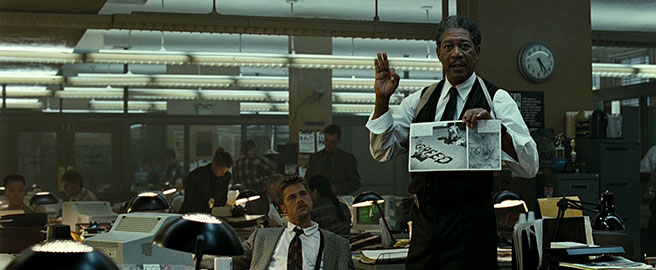 "There are seven deadly sins… Gluttony, Greed, Sloth, Wrath, Pride, Lust, and Envy. Seven."
"There are seven deadly sins… Gluttony, Greed, Sloth, Wrath, Pride, Lust, and Envy. Seven."
WHY WE'RE SATISFIED:
While almost every element of SEVEN has been praised at one time or another, it's almost certainly the film's finale that stays with audiences most. After turning himself in to the police, John Doe leads Mills and Somerset out to the desert to find his last two victims. As a mysterious box arrives via courier, John calmly tells Mills how he visited Tracy and, letting Envy get the better of him, took her head as a souvenir. When Somerset's reaction to the box confirms its contents and Mills learns Tracy was pregnant at the time of her death, he executes John Doe, thus becoming Wrath. We could get into a whole debate about the ins and outs of the ending alone. How can Mills be the Wrath victim if he doesn't die? Why do Tracy and the baby die if Doe's whole thing is about killing sinners? The agreed upon answer is generally some combination of the Mills family representing a single unit and the fact that David himself doesn't have to die to be a victim (in the same way the Sloth victim is still alive at the time of his discovery). While these questions certainly make for interesting discussion, the fact of the matter is that John Doe orchestrated an intricate series of murders, culminating in his own, successfully carrying out his plan and leaving the good guys in agony. It's certainly not a happy ending, but it's about as jaw-dropping and powerful as any out there.
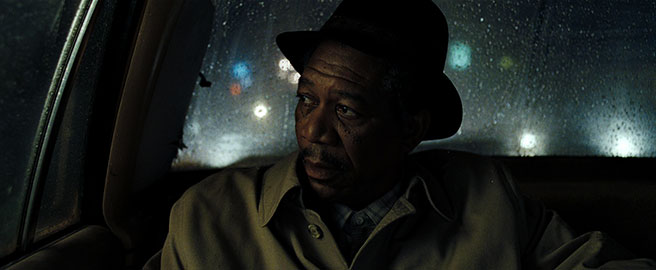 "Ernest Hemingway once wrote, 'The world's a fine place and worth fighting for.' I agree with the second part."
"Ernest Hemingway once wrote, 'The world's a fine place and worth fighting for.' I agree with the second part."
WHY WE REMEMBER:
If there's one thing missing from David Fincher's recent work, it's the dark, moody grit he brought to films like SEVEN and FIGHT CLUB. Surely, THE SOCIAL NETWORK and GONE GIRL call for a more crisp, sterile look and feel, but there's something to be said for a film that can pull you into a such bleak world simply using production design, lighting, and a ton of fake rain. Fincher is a master craftsman, and SEVEN, the first feature film he didn't walk out on, is an incredible early example of his abilities. The opening titles alone set the scene for the world of the film, with its handwritten credits, grimy Nine Inch Nails remix, and decayed, sepia-toned imagery. Howard Shore's haunting score sits below the surface adding tension and swells to near-melodramatic levels for the film's most intense moments. Andrew Kevin Walker's script deals with some very unsettling issues in such a balanced and refined way that even those who would normally never watch such a disturbing film are captivated. The cast is perfect, with each of the four leads going above and beyond the call of duty, and the cinematography and sound design add to the mystery, tension, and gloom of it all. Joining the ranks of PSYCHO, THE EXORCIST, and THE SILENCE OF THE LAMBS, SEVEN proves that unpleasant subject matter doesn't have to stand in the way of crafting a classic.
Thoughts? What else worked for you? What didn't? Strike back below!
If you have any movies you'd like to see put under the microscope, let us know below or send me an email at [email protected].








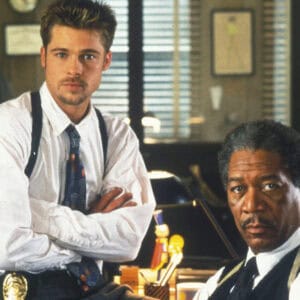
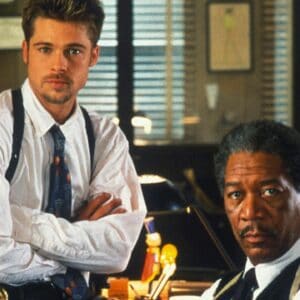










Follow the JOBLO MOVIE NETWORK
Follow us on YOUTUBE
Follow ARROW IN THE HEAD
Follow AITH on YOUTUBE